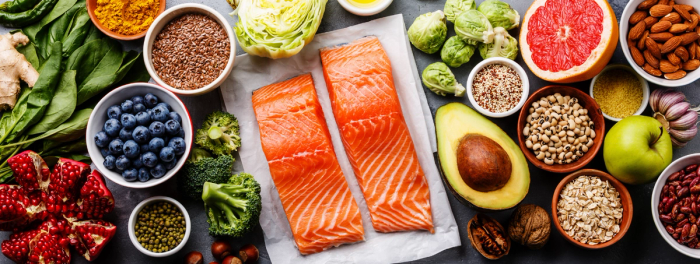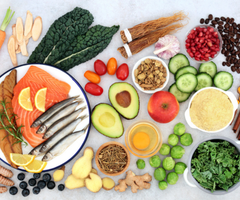question
what is an anti inflammatory diet?
An anti-inflammatory diet is a dietary approach designed to reduce inflammation in the body, which is particularly beneficial for individuals with inflammatory arthritis. While it won't cure arthritis, many people find it effective for managing symptoms, maintaining a healthy weight, and lowering the risk of other health issues.
Key Components of an Anti-Inflammatory Diet
-
Nutrient-Rich Whole Foods: The foundation of an anti-inflammatory diet consists of whole, unprocessed foods that are rich in nutrients. This includes:
- Fresh Vegetables: Aim for a variety of types and colours, particularly dark leafy greens like spinach and kale, as well as broccoli and cauliflower. Aim for at least four to five servings per day.
- Whole Fruits: Consume three to four servings of whole fruits daily, with a focus on berries and cherries, which are particularly high in antioxidants.
- Fatty Fish: Include sources of omega-3 fatty acids, such as salmon, mackerel, sardines, and tuna, which can help reduce inflammation.
- Healthy Fats: Opt for extra virgin olive oil, avocado oil, and fats from nuts and seeds.
- Whole Grains: Incorporate whole grains like brown rice, quinoa, and buckwheat.
- Legumes: Beans and lentils are excellent sources of protein and fibre.
-
Herbs and Spices: Incorporating herbs and spices like turmeric, ginger, and garlic can enhance flavour while providing anti-inflammatory benefits.
-
Hydration: Drink plenty of water, and consider green tea and organic coffee in moderation.
Foods to Avoid
To maximise the benefits of an anti-inflammatory diet, it's important to limit or avoid certain foods that can promote inflammation, including:
- Processed Meats: Such as sausages and cold cuts.
- Refined Sugars: Found in soft drinks, sweets, and many processed foods.
- Trans Fats: Common in deep-fried foods and commercially baked goods.
- Processed Snack Foods: Like chips and crackers.
- Excessive Alcohol: Limit intake to moderate levels.
Nightshades and Individual Sensitivities
Some individuals may find that nightshade vegetables, such as tomatoes and eggplants, trigger their arthritis symptoms. However, scientific evidence supporting this is limited. If you suspect a sensitivity, consider replacing these with alternatives like sweet potatoes or cauliflower.
Mediterranean Diet
The Mediterranean diet is often highlighted as a model for an anti-inflammatory diet. It includes a variety of fruits, vegetables, whole grains, healthy fats, and moderate amounts of dairy, which can contribute to overall health and may help manage arthritis symptoms.
Practical Tips for Incorporation
- Meal Planning: Prepare a shopping list focused on anti-inflammatory foods to help you stay on track.
- Cooking Methods: Opt for grilling, baking, or steaming rather than frying.
- Snacks: Choose healthy snacks like nuts, seeds, or fresh fruit instead of processed options.
- Experiment with Recipes: Try new recipes that incorporate a variety of anti-inflammatory ingredients to keep meals interesting.
Conclusion
An anti-inflammatory diet can be a valuable tool in managing arthritis symptoms and improving overall health. While it may not be a cure, the focus on whole, nutrient-rich foods can help reduce inflammation and enhance your quality of life. If you have specific dietary concerns or suspect food sensitivities, consulting with a healthcare professional or dietitian can provide personalised guidance.
This information is not a substitute for professional medical advice, diagnosis or treatment. Always consult a registered healthcare professional about matters that affect your health. Clara uses artificial intelligence to generate general information for personal educational purposes only, not intended to be a management plan and it may contain errors, inaccuracies or may oversimplify concepts.








